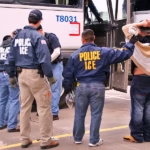Barely enacted, President Donald Trump’s executive order to end birthright citizenship has already faced its first major legal setback.
A federal judge in Seattle issued a temporary restraining order against the president’s executive order, deeming it a clear and indisputable violation of constitutional principles.
The decision came from Judge John Coughenour, a veteran jurist with over forty years on the bench. During the hearing, he remarked, “I can’t recall another case where the question posed was so crystal clear.” His ruling followed an urgent petition filed by Washington State Attorney General Nick Brown, joined by three other states, all governed by Democratic administrations.
Judge Coughenour didn’t hold back in criticizing the legal foundation of the executive order. Expressing his astonishment, he said, “I’m surprised that any lawyer could argue for its constitutionality,” adding, “Where were the legal experts when this executive order was drafted and signed?”
At the core of the dispute is the interpretation of the 14th Amendment, which guarantees citizenship to anyone born on U.S. soil and “subject to its jurisdiction.” The states challenging the order argue that it directly violates this constitutional provision, creating uncertainty about the citizenship of children born in the United States.
Lane Polozola, an attorney representing the state of Washington, underscored the urgency of the matter: “Births cannot be paused while the court deliberates this case.” He added that the children born during this period of uncertainty would face lasting harm. “Babies are being born today—in the plaintiff states and across the country—under a cloud of doubt about their citizenship,” he said.
The Trump administration defended the executive order, relying on the interpretation of the phrase “subject to its jurisdiction.” Brett Shumate, a Justice Department lawyer, argued that this language allows the exclusion of children born to undocumented immigrants or parents without permanent legal status. He urged the court to allow more time for a thorough examination of the legal arguments, warning against “a rushed decision on the merits.”
The Democratic-led states opposing the order also highlighted its practical implications. They warned that denying birthright citizenship would impose significant logistical and financial burdens on state programs, as children excluded from citizenship would no longer qualify for federal benefits.
Lane Polozola further argued that the harm caused by the executive order was not incidental but deliberate. “It seems that causing harm is the very intent of this executive order,” he stated during the court proceedings.
This legal battle marks one of the first significant challenges to President Donald Trump’s new immigration policies. The court’s temporary block will remain in place for 14 days, allowing for further hearings and a detailed examination of the case.
This article is based on reporting from CNN.







